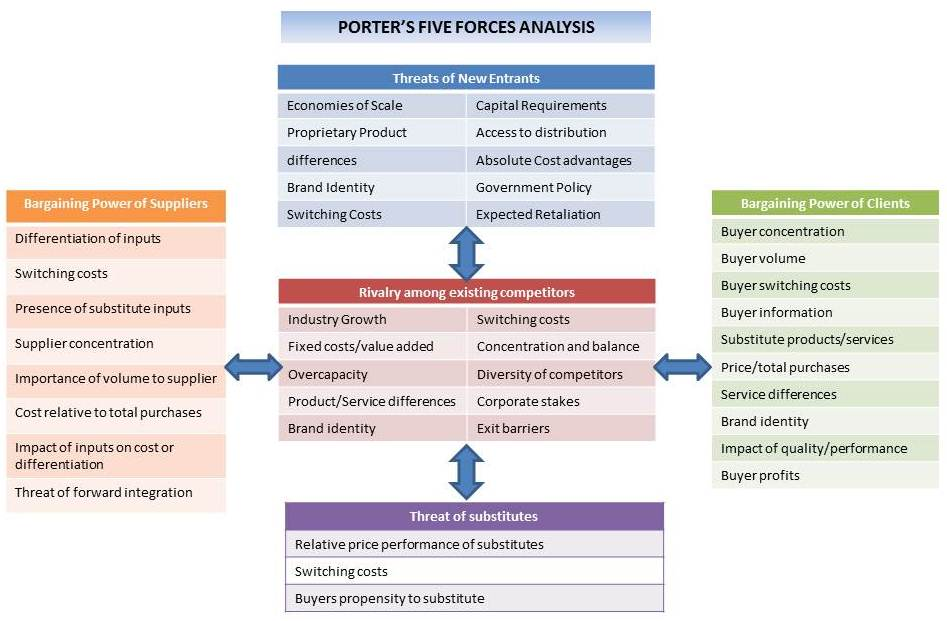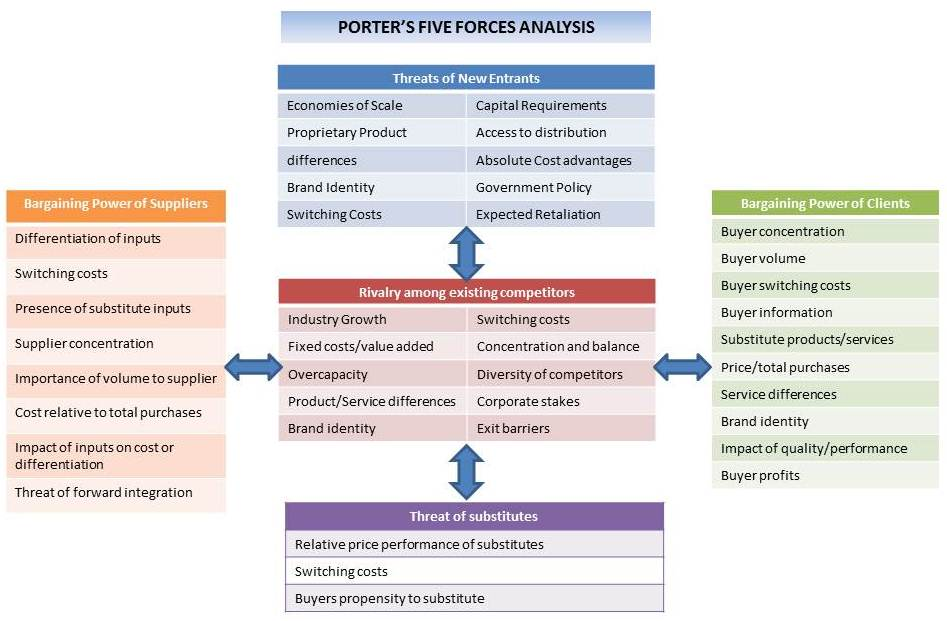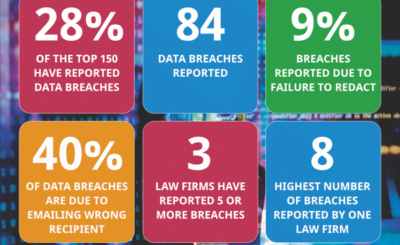Back to Basics – a Business Briefing for Lawyers: Checking out the Competition

Welcome to the July edition of Back to Basics — a Business Briefing for Lawyers. This month the focus is on checking out the competition—in management speak it’s called Competitor Analysis.
It’s not often that I dedicate a large part of the briefing to a graphic, but if you have any aspirations to compete it’s essential that you know how to check out the competition and what you may find when you do.
Michael Porter’s 5 Forces Analysis is an ideal tool to help you think about your competitors—and not just those who are in the same business.
There are competitive forces coming at you from all angles and to be aware of these is the first step towards shaping your offering to address the ever-changing competitive world.
Again, I need to be brief—Michael Porter dedicated a whole book to Competitive Strategy and this model appears in the first chapter— but I hope to cover the essentials
If you need any help in carrying out your analysis of the competition or using Porter’s 5 Forces Model please get in touch with me—I’d be delighted to help.
Brian O’Neill LL.B MBA
Business Consultant
40c Drakemyre
Dalry
North Ayrshire
KA24 5JE
t. 07855 838395
Existing Competitors
Like it or not, you are continuously in competition with other legal firms that do the same things as you, are in the same locality as you and trying to attract and service the same client base as you. This has been the traditional position of the legal profession in Scotland for years (although that is beginning to change). There are two aspects to this part of the analysis– the first part is to establish your own competitive strategy (and we looked at strategy in Back to Basics in July 2011) and once you’ve done that be aware of what other firms are doing to win and keep their clients. You need to consider whether your competitors are competing with you on price—and if they are and you don’t want to compete on price, then you might need to think about trying to attract a client base that is not as price sensitive as your competitors. Are your competitors’ differentiation strategies suitably robust that there is a clear difference in what they provide when compared to your services—or are yours suitably different from theirs? If not, then what can you do to change that? Please take some time to consider how you challenge to win and keep your clients and what other firms do to try to win them from you—and develop your strategy to meet that challenge.
Client Power
Clients are not, in the main, silly people. They are getting more and more savvy as time goes on and have realised for some time that their business is something that they can bargain with. This means that they can choose to “sell” their business to whoever will provide a service for the lowest cost. Yes, I hear you say, this has been going on for years—remember the “any conveyance for £250” of the early 1990s?
We’re in a double dip recession. Inflation is coming back to the expected levels after a bit of a high where wages were pegged back. People (your clients—be they individuals or businesses) are cost conscious and, as a result, many will want to know exactly what you will charge and, if the figures don’t suit them, may take their business elsewhere.
So, you need to consider what value you can provide to the client—your own reputational value will not be sufficient unless it is backed up by excellent service to the client at a price that the client is prepared to pay. Remember, a client will tell 10 people about a bad experience he or she has had but may not tell anyone about a good experience—and the same goes for the service you provide.
The threat of substitutes
The final threat you need to consider is what alternatives are out there that can do what you do? These exist already. A simple example of this is the Link2Law offering that is available to the public at large—essentially a document assembly web application that allows you, through a series of questions to create a range of documents that might otherwise traditionally be provided by a solicitor—but without a solicitor being involved (and this web offering is owned and operated by a large firm of solicitors in the north east of Scotland). This is the tip of a very large iceberg and over time we will see more “self service” web offerings without any solicitor being involved in the delivery.
Supplier Power
We’ve already seen lenders flex their muscles. They’ve thrown solicitors off their panels, restricted their panels to a very small number of solicitors and then suggest that the purchaser of property should use that small panel of solicitors to act on their behalf in the purchase transaction. I think this type of behaviour is anti-competitive and could be subject to challenge. Just think, you have a client who wants you to act but is told by their lender that it would be cheaper if they used the lender’s panel solicitor to deal with the purchase than their own solicitor. This is a very simple example of a supplier of services influencing the marketplace and introducing practices which put pressure on your clients to switch to a new solicitor—and once they’re gone, they might never come back.
Do you have other suppliers of business to your firm who are beginning to dictate the fee levels you can charge if you want to be passed business by them?
Do some of these suppliers actually provide part of the service you would normally provide and only leave you with a much smaller involvement—for which you can only charge a small fee?
Review your relationships with your suppliers and find out where the pressure points are—or where and when they are likely to come.
New Entrants
Yes, we’re back to that old chestnut—ABS, something that’s caused a lot of trouble within the legal profession in the course of the last couple of years and which is coming ever closer to reality. An ABS organisation will be part owned by non-solicitors and we have already seen a raft of licenses granted by the Solicitors Regulatory Authority in England to organisations ranging from the Co-op to Eddie Stobart (yes, that’s right, the haulage company). If you don’t believe me, have a look at this. Don’t be so naïve to think that the 51% ownership by qualified solicitors will be here to stay for ever—remember there is provision in the legislation for approved professionals being allowed to own that 51% share (in other words, the whole organisation) without there being the requirement for a solicitor to be involved in the ownership. We’ve already seen that Chartered Accountants being granted that status and it will not be too long before others follow. It’s not only ABS organisations that solicitors should worry about—the Legal Services (Scotland) Act 2010 also makes provision for the introduction of Registered Will Writers and Confirmation Practitioners who, along with ABS organisations, will be challenging for your business. Remember too that there are organisations that are looking at introducing services in non-reserved areas and these too will be competing with you for your clients. Prior to being authorised as a provider of legal services by the Solicitors Regulatory Authority in England, the Co-op last year turned over THIRTY MILLION POUNDS in revenue generated from the provision of legal services in non-regulated areas of business—and lest you think that you have time to spare before they get up to speed, I can tell you that I’ve already had a mailshot from the Co-op offering their funeral planning service coupled with their Wills and Executry services.
Think about it this way—you have many, many clients that you should be in touch with on a regular basis. The Co-op has many, many members that it is in touch with on a regular basis. Now, if the Co-op is in touch with its members who are also your clients and is offering them the kind of services that you provide and you haven’t been in touch with your clients to offer them these services then you will certainly be challenged to retain those clients for very much longer.
Simon says…..
What are you saying?
I’ve said it before – it’s an interesting time to be a law firm.
I think most lawyers have now realised that the recession has ended. It actually ended shortly after it began, there is no sign of any further recovery therefore it is safe to assume that this is it. So where are we? We find ourselves competing in a market that is smaller than it used to be and the results of firm’s not adapting to this are very evident. However, the question remains – how can you attract more of the active clients that are out there (than your competitors can)?
I am amazed that some firms still rely on a singular source of business particularly if its ‘word of mouth’! I can’t really count listing type adverts in Yellow Pages – if you are simply in a list with loads of other solicitors then I don’t see the point. Unless your advert really stands out; has a powerful message and strong call to action.
And there’s the first point of my piece – what is your message to your market place? How are you getting that message through? Is it working? Once you start doing that then your competitors have something to worry about. Until then, they don’t.
You will need to keep an eye on what they are doing. Those firms that are more focussed on winning new business will be easy to find – that’s the point. They have sorted out what they want to say and who they want to say it to.
Put yourselves in the shoes of different types of buyer – and imagine how they would go about finding you. There are different types of active clients and you may find your competitors are targeting particular types e.g. the cost conscious, the distraught, the elderly, the young, family owned businesses, sole proprietors, plc.’s, etc, etc. Notice that I haven’t said what type of work is involved – that is because I am targeting a type of person or type of business. This is how marketing works.
is my second point. Promoting yourself is a very necessary and vital aspect of business nowadays. You have survived the recession – congratulations; many firms haven’t. Now is the time to build your business. It’s up to you but if you should assume that your competitors are because everyone is in the same boat and those that take proactive steps will have a better chance of progressing into the future than those that stand still. That’s what promoting yourself does – it improves your chances. It is a competitive world for the majority of law firms and it’s only going to get worse. Whilst the number of mid and large firms contract, the number of small firms emerging is growing and then we will have new entrants coming next year. And there will be new entrants. The competition is increasing and will increase further despite the smaller number of active clients! They must be confident that they can attract a decent share.
Now is the time to position yourself in your market place.
Simon Greig is Sales Manager of LawWare Limited, Edinburgh. Contact Simon at simon@lawware.co.uk
Contact us
Brian O’Neill LL.B MBA, Business Consultant, t. 01294 833220, m. 07855 838395, e. brian@drakemyre.co.uk
Simon Greig is Sales Manager of LawWare Limited, Edinburgh. Contact Simon on simon@lawware.co.uk









Recent Comments